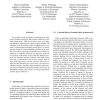Free Online Productivity Tools
i2Speak
i2Symbol
i2OCR
iTex2Img
iWeb2Print
iWeb2Shot
i2Type
iPdf2Split
iPdf2Merge
i2Bopomofo
i2Arabic
i2Style
i2Image
i2PDF
iLatex2Rtf
Sci2ools
IAT
2005
IEEE
2005
IEEE
Complexity of a theory of collective attitudes in teamwork
Our previous research presents a methodology of cooperative problem solving for BDI systems, based on a complete formal theory. This covers both a static part, defining individual, bilateral and collective agent attitudes, and a dynamic part, describing system reconfiguration in a dynamic, unpredictable environment. In this paper, we investigate the complexity of the satisfiability problem of the static part of our theory, focusing on individual and collective attitudes up to collective intention. Our logics for teamwork are squarely multi-modal, in the sense that different operators are combined and may interfere. One might expect that such a combination is much more complex than the basic multi-agent logic with one operator, but in fact we show that the individual part of our theory of teamwork is PSPACE-complete. The full system, modeling a subtle interplay between individual and group attitudes, turns out to be EXPTIME-complete, and remains so even if propositional dynamic logi...
Collective Agent Attitudes | Collective Attitudes | Complete Formal Theory | IAT 2005 | Intelligent Agent |
| Added | 24 Jun 2010 |
| Updated | 24 Jun 2010 |
| Type | Conference |
| Year | 2005 |
| Where | IAT |
| Authors | Marcin Dziubinski, Rineke Verbrugge, Barbara Dunin-Keplicz |
Comments (0)

